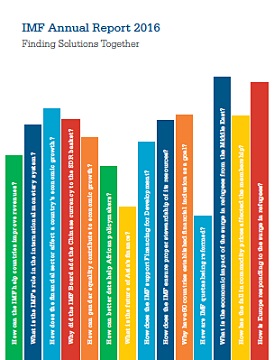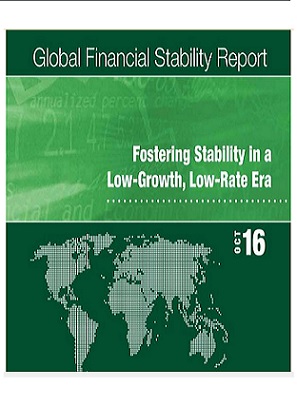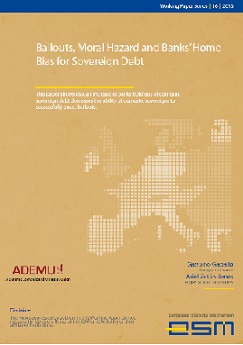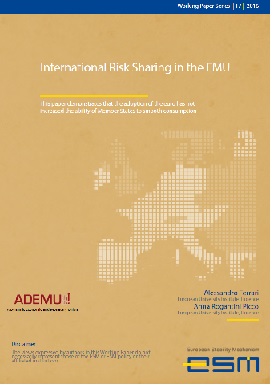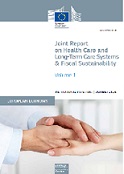International Monetary Fund, (2016), “International Monetary Fund Annual Report 2016”, IMF, Σεπτέμβριος The year was marked by difficult challenges and milestone achievements. To reinvigorate modest growth at a time of uncertainty about a complicated global economy, the IMF membership endorsed a three-pronged approach of monetary, fiscal, and structural policies to get the world economy back on a stronger and safer growth track. Highlights of the IMF’s work during the year …Read More
Global Financial Stability Report: Fostering Stability in a Low-Growth, Low-Rate Era
International Monetary Fund, (2016), “Global Financial Stability Report: Fostering Stability in a Low-Growth, Low-Rate Era”, IMF, Οκτώβριος The current report finds that short-term risks to global financial stability have abated since April 2016. The rise of commodity prices from their lows, along with the ongoing adjustments in emerging markets, has supported a recovery in capital flows. In advanced economies, weaker growth has been mitigated by the prospect of further monetary …Read More
Stress testing the EU fiscal framework
Masten, Igor, Grdović Gnip, Ana, (2016), “Stress testing the EU fiscal framework”, VoxEU, 13 Οκτωβρίου Fiscal policies in European Economic and Monetary Union states are being reinforced. This column argues that the cyclically adjusted budget balance will be an imprecise tool for measuring fiscal discipline, and structural deficit rules limits are too stringent. If the official methodology is used to trigger corrective fiscal contractions, it may increase macroeconomic instability. Σχετικές Αναρτήσεις …Read More
Bailouts, Moral Hazard and Banks’ Home Bias for Sovereign Debt
Gaballo, Gaetano, Zetlin-Jones, Ariel, (2016), “Bailouts, Moral Hazard and Banks’ Home Bias for Sovereign Debt“, ESM Working Paper Series, July We show that an increase in banks’ holdings of domestic sovereign debt decreases the ability of domestic sovereigns to successfully enact bailouts. When sovereigns finance bailouts with newly issued debt and the price of sovereign debt is sensitive to unanticipated debt issues, then bailouts dilute the value of banks’ sovereign debt holdings rendering bailouts less …Read More
Fiscal decentralisation and income inequality
Stossberg, Sibylle, Bartolini, David, Blöchliger, Hansjörg, (2016), “Fiscal decentralisation and income inequality”, OECD Economics Department Working Papers No. 1331, 11 Οκτωβρίου This paper investigates the relationship between fiscal decentralisation and economy-wide disposable income inequality. Drawing on a dataset of up to 20 OECD countries over a period from 1996 to 2011, a regression analysis is performed, relating several indicators of national income inequality and a wide array of fiscal decentralisation indicators. …Read More
Hysteresis and fiscal policy during the Global Crisis
Fatás, Antonio, Summers, Lawrence, (2016), “Hysteresis and fiscal policy during the Global Crisis”, VoxEu, 12 Οκτωβρίου Conventional wisdom on supply and demand suggests that demand shocks are cyclical or transitory, and that only technology shocks are responsible for trend changes. This column argues that cyclical events can have permanent effects on demand, and therefore GDP. It is time for policymakers to start considering the possibility of hysteresis seriously. Σχετικές Αναρτήσεις Ubide, Ángel, …Read More
The case for an active fiscal policy
Ubide, Ángel, (2016), “The case for an active fiscal policy”, VoxEU, 11 Οκτωβρίου The pre-crisis consensus was, and remains, very strong – the business cycle would be managed by monetary policy, while fiscal policy would focus solely on debt sustainability. In a world of zero interest rates, however, fiscal policy has to contribute to supporting aggregate demand and protecting against deflationary risks. This column outlines three ways in which a well-designed expansionary …Read More
Economic consequences of the 1953 London Debt Agreement
Galofré-Vilà, Gregori, McKee, Martin, Meissner, Christopher, David, David, (2016), “Economic consequences of the 1953 London Debt Agreement”, VoxEu, 9 Οκτωβρίου In 1953, the Western Allied powers approved the London Debt Agreement, a radical plan to eliminate half of Germany’s external debt and create generous repayment conditions for the remainder. Using new data from the historical monthly reports of the Deutsche Bundesbank, this column argues that the agreement spurred economic growth by …Read More
International Risk Sharing in the EMU
Ferrari, Alessandro, Rogantini Picco, Anna, (2016),“International Risk Sharing in the EMU” , ESM Working Paper Series, Ιούλιος 2016 This paper aims at empirically assessing the effect of the adoption of the euro on the ability of euro area member states to smooth consumption and share risk. With the objective of evaluating the economic performance of euro area countries in the scenario where the euro had not been adopted, we construct a counterfactual dataset of macroeconomic variables …Read More
Joint Report on Health Care and Long-Term Care Systems & Fiscal Sustainability
European Commission, (2016), “Joint Report on Health Care and Long-Term Care Systems & Fiscal Sustainability”, European Commission Publications, 7 Οκτωβρίου This report, prepared by the staff of the European Commission’s Directorate-General for Economic and Financial Affairs and the Economic Policy Committee (Ageing Working Group), presents policy challenges for health care and long term care, and options on how to contain spending pressures through efficiency gains, in order to ensure fiscally sustainable …Read More




